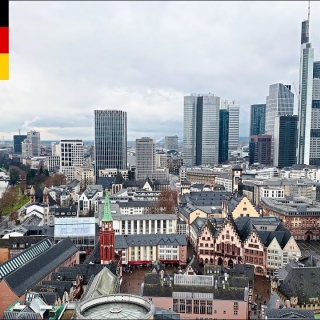


The European Central Bank cut interest rates on Thursday and policymakers guided for a further reduction in March as concerns over lacklustre economic growth supersede worries about persistent inflation.
It was the fifth ECB rate cut since June and markets expect two or three more this year, driven by arguments that the biggest inflation surge in generations is nearly defeated and the flagging economy needs relief.
"We know the direction of travel," ECB President Christine Lagarde told a press conference after the decision.
"At which pace, with what sequence, what magnitude, will be informed by the data that we will collect in the coming weeks and months and by the analysis that our staff will conduct."
Three ECB policymakers who spoke to Reuters on Thursday said they thought a further rate cut was likely to go through in March without much resistance before debate within the Governing Council on further easing becomes more heated.
With the euro zone economy stagnating in the last quarter due to an industrial recession and weak consumption, the ECB is seen sticking to its easing path even after the U.S. Federal Reserve kept rates unchanged and hinted at a lengthy pause.
ECB policymakers are likely to have breathed a sigh of relief after new U.S. President Donald Trump's administration did not impose blanket trade tariffs as feared, although his threats to do so have cast a shadow on the outlook.
Lagarde said tariffs would have a "global negative impact" on growth but their potential effect on inflation was "far more complicated" due to possible retaliation and market adjustments.
A rate cut in March would take the ECB's deposit rate to 2.5% - the upper end of the so-called neutral range, which neither spurs nor stifles economic activity, according to ECB staff estimates.
The three policymakers who spoke to Reuters after the meeting said they expected a broader, deeper discussion about whether borrowing costs should fall below that level, as already suggested by board member Isabel Schnabel.
On the one hand, wage growth across the 20 countries that share the euro currency is easing, the labour market is softening, oil prices have come off early-year highs and the dollar's relentless firming seems to have stopped for now.
But inflation is still above the ECB's target and poor productivity growth along with labour shortages could keep up price pressures, likely limiting just how far the bank can go.
Perhaps laying the ground for this debate, Lagarde said ECB staff would publish a new estimate of the neutral rate on Feb. 7. Last week, she trimmed her own range to 1.75%-2.25%.
"We are not at neutral rate. This is a debate that is entirely premature," she said.
"When we get closer to that, we will operate on the basis of a staff research paper, on the basis of the analysis provided by staff, and then that will help us determine how close we are and what our monetary policy stance should be."
Economists generally expect the ECB to cut rates further.
"We maintain our view that the ECB will cut rates to below the neutral rate in order to support the economy," Nomura said in a note to clients.
3rd party Ad. Not an offer or recommendation by Investing.com. See disclosure here or remove ads.
"We expect a terminal rate of 1.75% by September 2025, and we see risks of further cuts should U.S. tariffs prove more punitive than we have pencilled in.(Cay) Newsmaker23
Source: Investing.com
The upcoming Supreme Court ruling on the legality of President Donald Trump's massive tariffs, which rocked markets in April, is one of the next major tests for US stocks and bonds. Equity markets ha...
The US seized two Venezuela-linked oil tankers in the Atlantic Ocean on Wednesday, one of which was sailing under a Russian flag, as part of President Donald Trump's aggressive efforts to regulate oil...
France is working with partners on a plan on how to respond should the United States act on its threat to take over Greenland, a minister said on Wednesday, as Europe sought to address U.S. President ...
The world community must make clear that U.S. intervention in Venezuela is a violation of international law that makes the world less safe, the Office of the United Nations High Commissioner for Human...
US President Donald Trump threatened on Friday to come to the aid of protesters in Iran if security forces open fire on them, days after unrest that has killed several people and posed the biggest int...
Oil prices stabilized on Thursday (February 12th), as the market reassigned a risk premium to US-Iran tensions despite US inventory data showing swelling domestic supplies. This movement confirms one thing: geopolitical headlines are still more...
Gold prices weakened slightly on Thursday (February 12th), as more solid US employment data reduced market confidence in an imminent Federal Reserve interest rate cut. The strong employment data prompted market participants to shift expectations of...
The Hang Seng Index reversed its downward trend in Hong Kong on Thursday (February 12th), weakening by around 0.9% to around 27,000 after a strong session earlier. This decline halted the momentum of the short term rally, as investors began to...